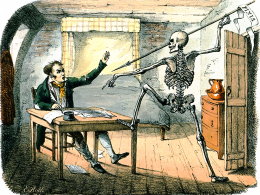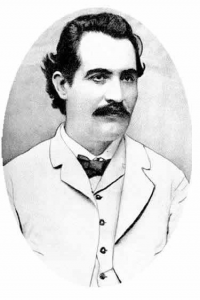1943 was not a happy year for the Third Reich. After the disaster of Stalingrad came the catastrophe of Kursk, then the loss of North Africa. The Wehrmacht was on the defensive. America was beginning to enter the European theater in earnest. But it was a great one for German cinema due to the release of Munchhausen . Based on the exploits of Baron von Munchhausen, one of the literary world’s most famous yarn-spinners, it was a very high-prestige production made in full color, directed by Josef von Baky and starring Hans Albers as the Baron. (more…)
Tag: mortality
-
Author’s Note: In a recent livestream, Mary Ann asked, “Did you have a midlife crisis? What did you learn?” Hyacinth Bouquet transcribed my answer, and I cleaned it up a bit. I want to thank Mary Ann for her question and Hyacinth for her help.
-
1,180 words
It always sounds silly to me when people tell the dead to “rest in peace.”
Practically speaking, don’t you have to disturb their rest to tell them that? It makes about as much sense as nudging someone who’s snoring to say, “Hey — HEY! Wake up and go to sleep.” (more…)
-
2,289 words
Recently I had surgery. It went well, nothing serious. However, it was unexpected. I had to ask myself — what if it was serious? What if my body was riddled with stage 4 cancer and I’d better say my prayers, update my will, and buy a grave? (more…)
-
Seneca and James Romm, ed., trans.
How to Keep Your Cool: An Ancient Guide to Anger Management
Princeton University Press, 2019Long before self-help books, pop-psychology gurus, TED talks, non-fiction political punditry, and “anger-management” classes, the ancients dispensed wisdom on a variety of topics, personal and societal. (more…)
-
Of peasant ancestry on his father’s side and boasting aristocratic (boyar) maternal roots, the Romanian poet, prose writer, and editorialist Mihai Eminescu (1850-1889) had not put his modest inherited wealth to waste. Educated in the German language since childhood, Eminescu was culturally — if not always geopolitically — an enthusiastic Germanophile. (more…)
-
1,937 words
The lexicon of mendacious government platitudes has gained another ignominious entry. “Just three weeks to flatten the curve!” they implored one long year ago. Yet after twelve months of authoritarianism and state-enforced solitude, SWAT teams are swooping in to arrest Miami spring break revelers, and lockdown protests from Amsterdam to Kassel are intensifying across Europe. (more…)
-
March 24, 2021 Kathryn S.
“He Doesn’t Worry Too Much If Mediocre People Get Killed in Wars and Such” Tito Perdue’s The Smut Book & Cynosura
4,430 words
He had me at: “It was still the South, he knew it for a certainty when they passed an aged negro in overalls hobbling down along the highway toward no conceivable destination. The land was cursed. God, he loved it.” [1] Tito Perdue, author of the two novels here reviewed, The Smut Book and Cynosura, is a proud Southerner who has enjoyed skewering the sacred cows of these, our cursed times since he became a writer in the early 1980s. (more…)
-
6,056 words

6,056 words

Part 1, Part 2, Part 3, Part 4
In the last installment, I began to explore the possibility that The Birds can be understood as an “existentialist” parable. I argued that the film depicts what Heidegger calls das Ereignis (the event): a sudden and fundamental transformation of the meaning of everything. (more…)
-

Jean Auguste Dominique Ingres, Dream of Ossian, 1813.

Jean Auguste Dominique Ingres, Dream of Ossian, 1813.
1,437 words
The first rocket in over a decade has blasted off from US soil, bound for stars, aiming to dock with the International Space Station. Yet the country it leaves behind is set aflame, riven by racial strife in some of the most widespread unrest in recent memory. The world emerges from months of stasis and pseudo-imprisonment, facing an uncertain political and economic future in the wake of the coronavirus. In 1992, Francis Fukuyama predicted the end of history (more…)
-
November 29, 2015 Jarosław Ostrogniew
Über die Sterblichkeit








